
become an rwinsider to unlock
exclusive perks like
join. shop. earn.
Don’t worry, you can unsubscribe at any time.
Reitmans (Canada) Limited | 250 Sauvé West | Montreal, QC | H3L 1Z2 | www.rw‑co.com
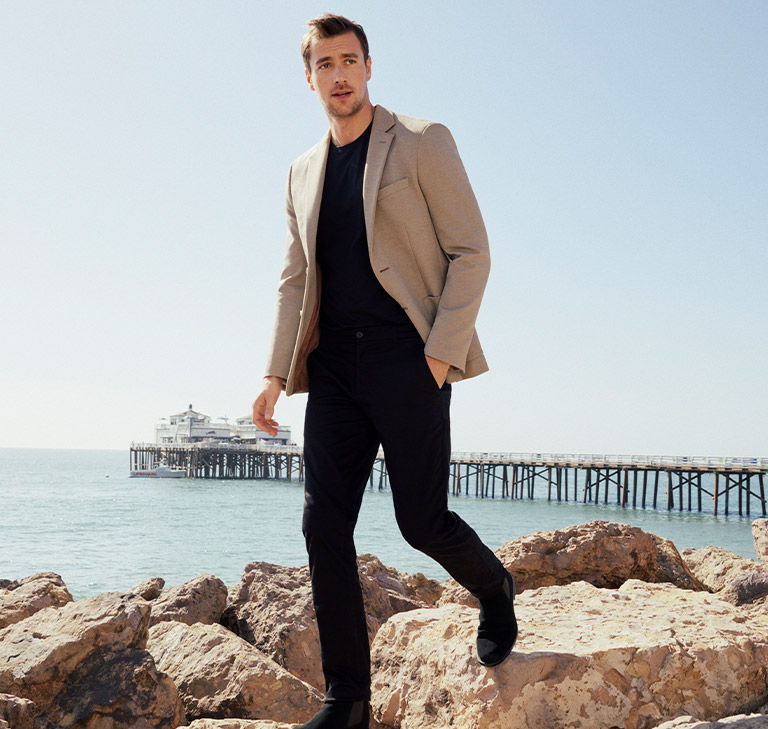
"Business Casual" is a dress code that many guys find a little confusing. It's meant to be a style of clothing that's less formal than traditional businesswear, while still giving off a professional and businesslike impression.
In fact, it's the perfect balance between looking good and feeling comfortable. It's also versatile enough to take you from day to night, desk to dinner, and even from work to weekend.
Whether you're looking to dress up for Casual Fridays or simply want to incorporate some casual pieces into your work wardrobe, our guide to business casual has got you covered. We've compiled a list of our favorite go-to outfits that you can easily put together with some key pieces in your wardrobe. With these pieces, you'll never have to worry about what to wear to work again!
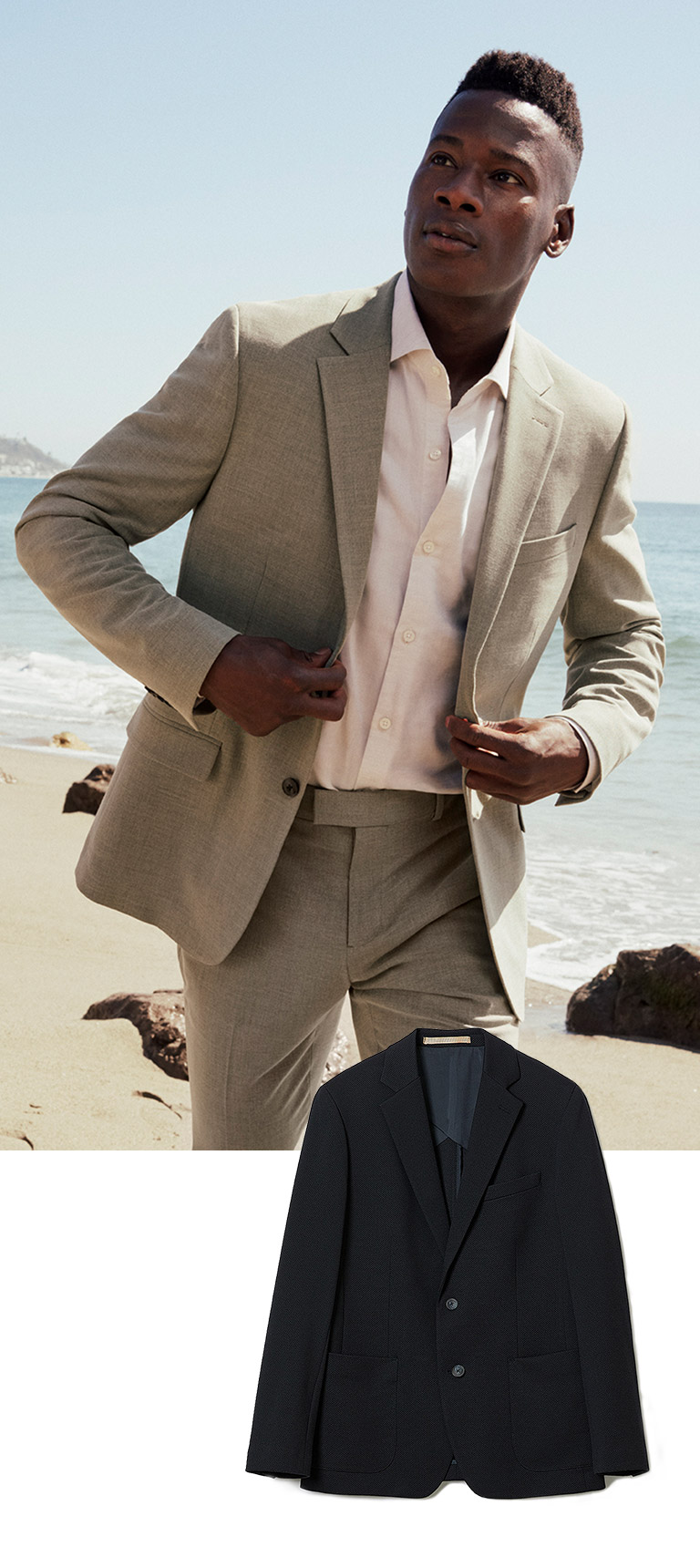
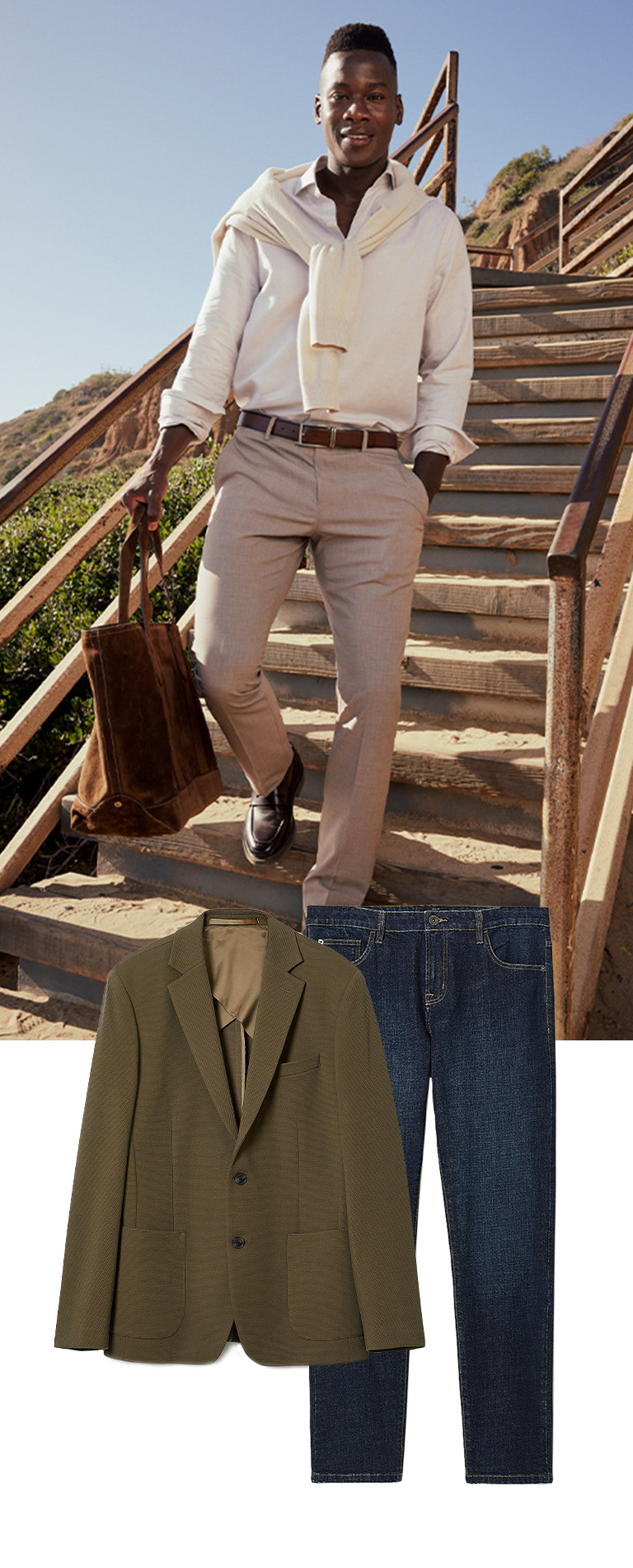
You can never go wrong with a white buttoned-down shirt. It can be mixed and matched, layered or worn on its own. Pull it together with a blazer and chinos and voila, there’s no more running home after work to change before your après work fun.
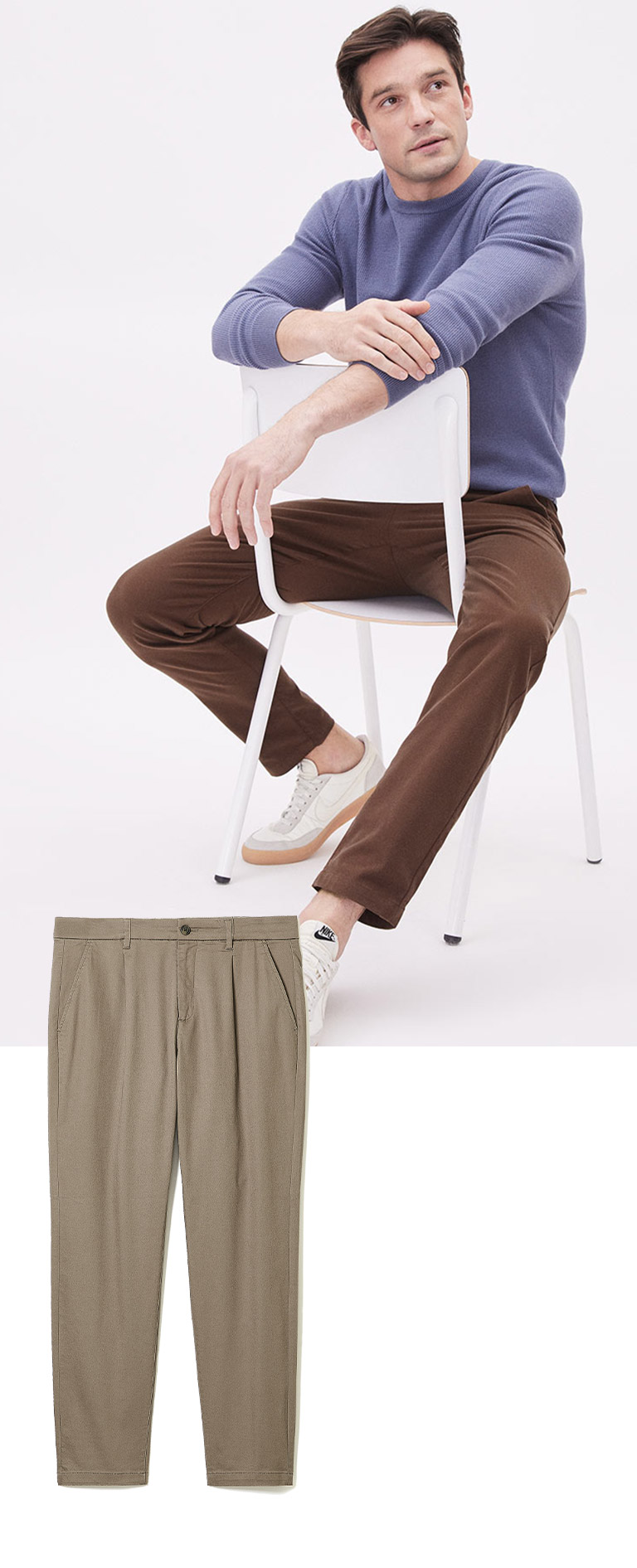
Their versatility makes them the perfect piece to stay comfy but also look good. Chino needs to be in your Business Casual vocab, they’re your partner in crime from Monday through Sunday.
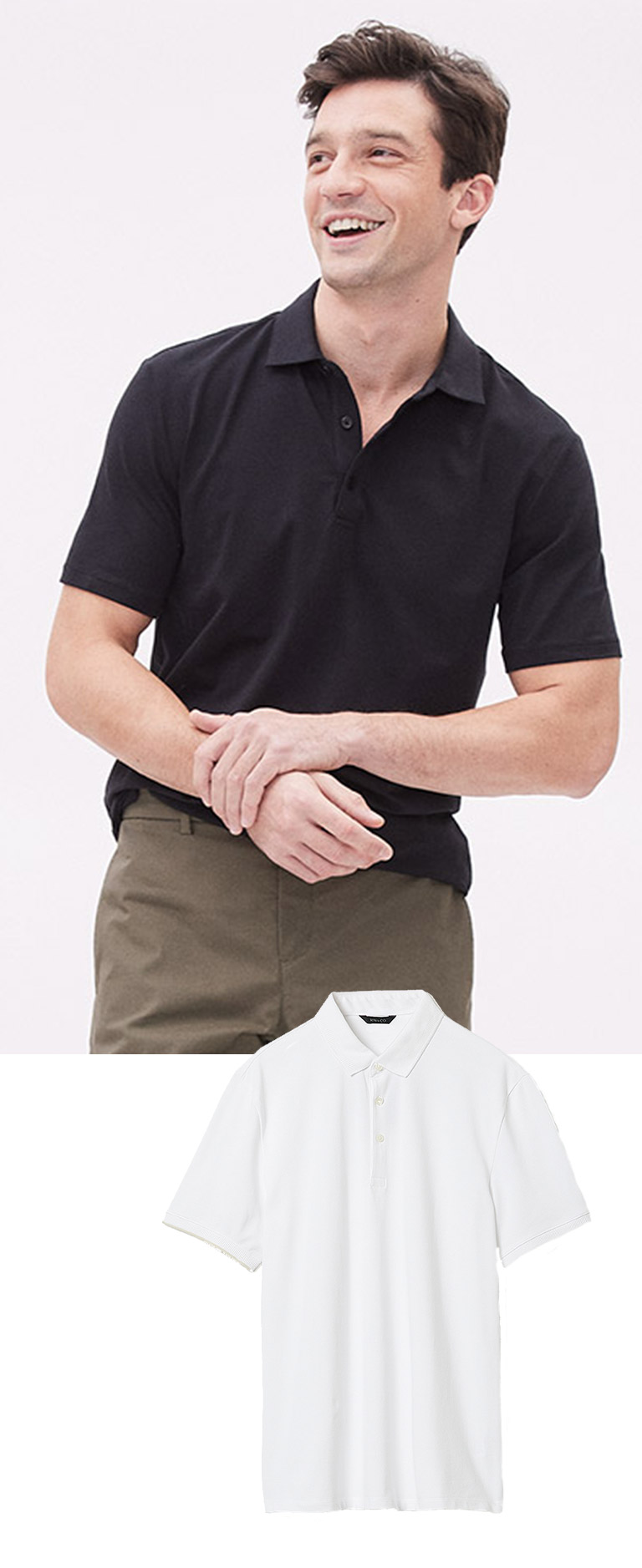
Corporate by day, cool by night. That’s what we’re all looking for, right? The final piece to your business casual puzzle is a polo shirt; depending on your own personal style, there are so many colour and pattern options to choose from. Easily worn on their own with your favourite pair of chinos or throw on a blazer for a more refined look.
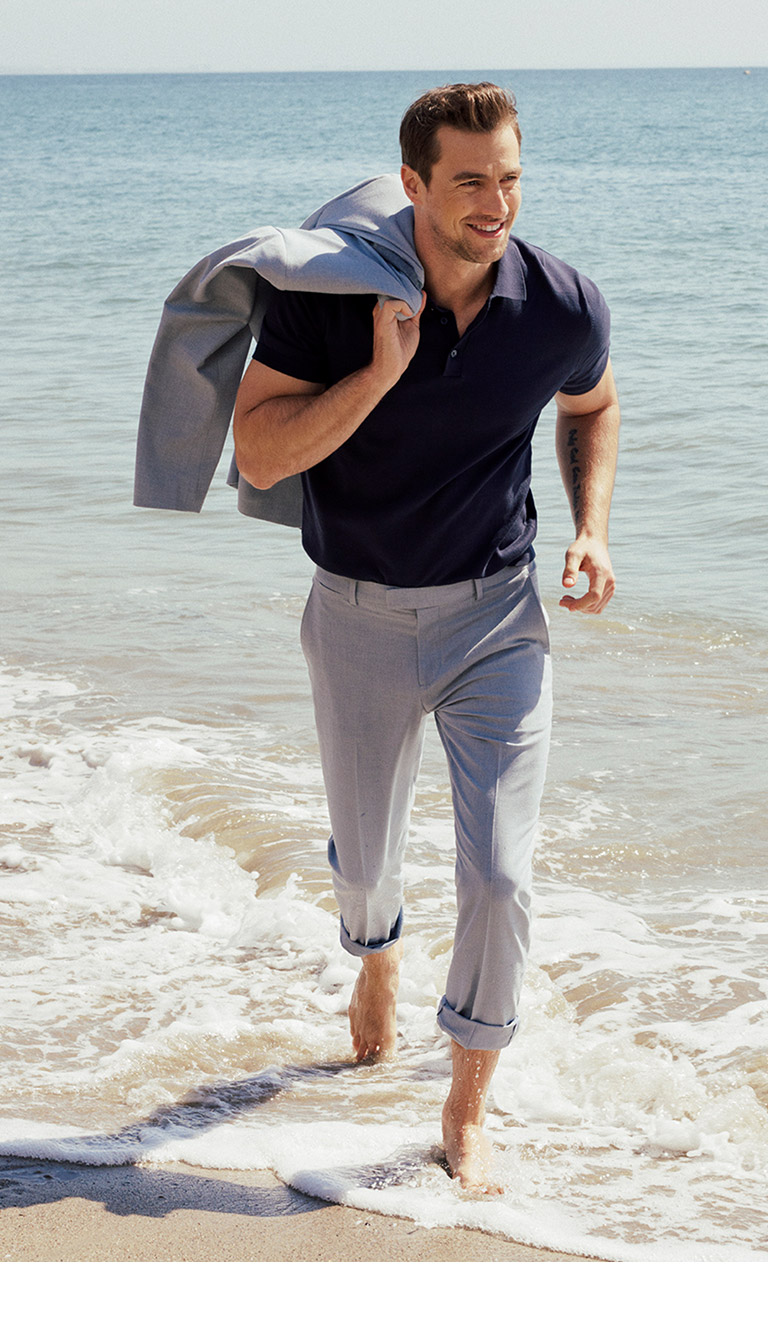
Now, for a business casual trade secret, start with a jacket and build your look from there. They’re incredible at giving a refined look with minimal effort, because getting dressed in the morning shouldn’t be the reason why you’re late for work. One way we love to style a jacket is with a minimal top and a statement bottom. It's the perfect outfit for when you’re on the go.
Business casual attire for men typically consists of dress pants or chinos, a collared shirt or sweater, and dress shoes or loafers. Ties are optional, but if worn, should complement the rest of the outfit. Jackets, blazers, or sport coats may also be appropriate, depending on the workplace.
It's important to note that business casual can vary by industry and company, so it's always a good idea to check with the company's dress code policy or ask a supervisor for guidance. In general, business casual attire should look neat, clean, and professional.
Business casual dress code has gained popularity amongst men for several reasons. First, it offers a more relaxed and comfortable alternative to traditional business attire, which can be constricting and uncomfortable. Business casual allows men to express their personal style while still maintaining a professional appearance.
Second, many companies have adopted a business casual dress code as a way to create a more relaxed and approachable workplace culture. This can help employees feel more comfortable and productive, and may also make the company more attractive to job candidates. Finally, the rise of technology and remote work has also contributed to the popularity of business casual attire. With more people working from home or in casual environments, there is less need for formal business attire. Business casual allows men to dress appropriately for work while still feeling comfortable and relaxed.
Layering is an important technique for achieving a polished business casual look. One way to layer is by wearing a blazer over a dress shirt, which adds sophistication and formality. Another option is to wear a sweater over a collared shirt, which adds warmth and contrast.
Choose pieces that complement each other in terms of color and texture, and keep it simple by sticking to a neutral color palette. Layering allows you to adapt your attire to changing weather or dress codes while still looking stylish.
In more creative industries such as advertising or tech startups, the dress code tends to be more relaxed and informal. In these settings, it's common to see guys wearing jeans, sneakers, or even t-shirts to work.
However, it's important to note that even in these more casual environments, it's still important to maintain a certain level of professionalism. The sweet spot would be a high-quality dark denim or khaki pants, clean sneakers, and well-fitting shirts to maintain a polished appearance.
On the other hand, in more conservative industries such as finance or law firms, the dress code tends to be more formal. In these settings, it's important to stick to dress pants, dress shoes, and collared shirts.
Avoid wearing bright or bold colors, and opt for more subdued shades like navy, gray, or black. Dressing appropriately in these settings not only demonstrates respect for the company culture but can also help you feel more confident and professional in your role.
A polo shirt and jeans may not be the best choice for a business casual event, depending on the context and specific dress code requirements of the event. Of course, if you work at a law firm, you might just go for a suit right away and skip the polo/jeans combo.
While a polo shirt can be a versatile piece for business casual attire, it is generally more appropriate to pair it with dress pants or chinos rather than jeans or dark denim. Jeans can be seen as too casual for many business casual settings, especially those that require a more professional appearance.
Sneakers can be appropriate for a business casual attire, depending on the specific dress code requirements of the event and the style of the sneakers. Generally speaking, dressier sneakers made from high-quality materials and with a sleek design can be appropriate for business casual outfits.
However, it's important to remember that sneakers are still seen as more casual than dress shoes, so they may not be appropriate for all business casual events. For example, sneakers may be acceptable for a tech company's casual Friday dress code, but they may not be appropriate for a job interview or a meeting with a high-level executive.
Wearing a t-shirt to a business casual event is generally not appropriate, as t-shirts are considered too casual for most business settings. Business casual attire is typically more polished and professional than casual attire, and a t-shirt may not convey the level of professionalism required for many business casual events.
However, there are some exceptions to this rule. If the dress code for the event specifically allows for t-shirts, or if you work in a creative or more relaxed industry, a well-fitted, high-quality t-shirt in a neutral color can be acceptable. In these cases, it's important to pair the t-shirt with more formal pieces, such as dress pants or a blazer, to balance out the casualness of the t-shirt.
When it comes to dressing in business casual attire, men need to choose colors that look professional and polished. The safest bet is to stick with neutral tones such as navy, gray, and black because they're versatile and can be matched with other colors.
Earthy hues like brown, beige, and olive green are also great choices because they add a bit of warmth to an outfit while still maintaining a professional look. However, it's a good idea to steer clear of overly bright or bold colors in a business casual setting.
That said, you can still add a pop of personality to the dress code with subtle touches of color, like a maroon tie or a light blue dress shirt. Just remember to keep it tasteful and professional!
It's important to select materials that strike a balance between comfort and professionalism when it comes to business casual dress code. Natural fabrics such as cotton, linen, and wool are great options as they offer breathability, durability, and comfort.
For instance, a crisp cotton shirt paired with wool trousers can create a polished look while still being comfortable enough for long hours at the office. Additionally, lightweight fabrics such as chambray, seersucker, and linen-blends are perfect for summer months, as they allow air to flow freely and keep you cool.
Sort by: New arrivals